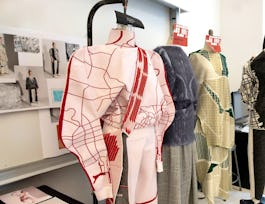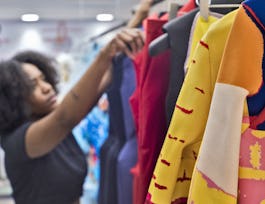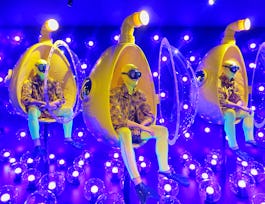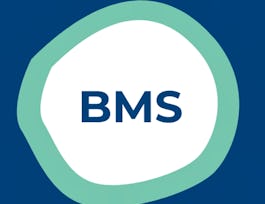Sometimes when we say we work with sustainable fashion people look at us like... "Mmmm, is it really possible for something like fashion to be sustainable?" And let's face it, people are right being suspicious. If anything the fashion industry has become increasingly unsustainable over the last decades, using more and more natural resources and creating more and more waste.


Sustainable Fashion
Taught in English
Some content may not be translated
58,326 already enrolled
(709 reviews)
What you'll learn
You will broaden your knowledge on sustainable fashion, sustainable business models, circular economy and related concepts.
You will understand the challenges and opportunities brands face when they try to create or transition into sustainable business models.
You will learn the basic vocabulary and tools to discuss sustainable business models’ ideas and concepts in the context of fashion.
You will be inspired by case examples from the fashion industry, and learn the details of their innovative and sustainable business models.
Details to know

Add to your LinkedIn profile
13 quizzes, 1 assignment
See how employees at top companies are mastering in-demand skills


Earn a career certificate
Add this credential to your LinkedIn profile, resume, or CV
Share it on social media and in your performance review

There are 8 modules in this course
The fascinating thing about fashion is that everybody wears clothes every day. No matter where you live or how much money you have. It is something we all share. Therefore clothing is an incredibly interesting starting point for a discussion about sustainability and sustainable business. Over the last decades, questions of sustainability have become increasingly prominent in the industry. As a response, important efficiency gains in the production and processing of clothing, for instance in the form of water management and electricity use, have been made. Nonetheless, due to the ever-increasing demand for materials, things have only gotten worse, not better. In response, we now see institutions like the European Union introducing regulation to put an end to fast fashion and shift business and consumption practices towards durability, repair, and care. In effect, what we’re looking towards is a re-creation of our clothing culture and business models. Maybe a return to clothing cultures (in plural), in such a way that newness will no longer be a matter of new trends (and waste) every second week, but a matter of clothing with actual identity embracing cultural and bodily differences. To respond to this increase in critical consumers and media and, not least, regulation, fashion companies need to find more sustainable ways of doing business. This is no easy task, but it is an urgent and exciting one that requires collaboration and new ways of doing business! In this module, you will meet representatives from the industry who will briefly introduce you to some of the fundamental challenges and opportunities for practising sustainability. Moreover, you will meet us, Esben, Ana and Kirsti, who will have the pleasure of guiding you throughout this course.
What's included
1 video4 readings1 discussion prompt
In this module, we will introduce you to the textile and fashion industry. First, we will touch upon some of the basic numbers - e.g., what is the size of the industry? Then we will look into some of the fascinating processes behind the making of garments, but also discuss some of the fundamental challenges that the industry is facing in relation to social and environmental sustainability. Next we will introduce the concepts of sustainability and business models. This will give you the foundation to continue your explorations into business models for sustainability innovation within the textile and fashion industry.
What's included
3 videos1 reading3 quizzes1 discussion prompt
This module will introduce you to a theoretical framework for sustainable business models and the differences between these models and traditional business models. Additionally, you'll gain insights from Elena Salcedo, an expert in sustainable business models employed by one of the world's leading fashion brands, as she shares her perspectives on questions related to sustainability transformation. You will also have the opportunity to meet Silke Sønderstrup-Grandquist and Anja Padget from the Danish consulting firm, Sourcing House, who will share their experiences of working with brands to transform business practices towards sustainability. Finally, Thomas Medard Frederiksen and Stine Vestergaard-Hansen, Co-Founders of SassyLab will introduce us to their second-hand platform SassyLab. They will discuss challenges and opportunities in making the resale of garments a profitable business.
What's included
5 videos2 readings2 quizzes1 discussion prompt
In this module, you will be introduced to the fundamental concepts that delineate the circular economy as a whole, with a specific focus on circular fashion. We will outline some of the challenges confronting the fashion industry in its transition towards circularity. Following this overview, you will have the opportunity to hear insights from our colleague Dr. Kerli Kant Hvass, who has many years of experience working with both public and private stakeholders on questions of the circular economy. Additionally, Kirsti will present interesting examples of companies within the fashion sector working towards circularity. Finally, you will also become acquainted with MUD Jeans, a company pioneering the leasing and recycling of jeans. We hope you will find this journey engaging and enlightening. As also emphasised in the readings for this module, there is a growing recognition that for the circular economy to truly advance sustainable development, it's imperative for industries to prioritise investment in the inner circles of circularity. These include Refuse (to generate waste in the first place), Reuse, and Repair, all aimed at prolonging the active lifespan of garments.
What's included
5 videos2 readings2 quizzes1 discussion prompt
The materials used in garment production garner significant attention in discussions surrounding the industry's sustainability. Indeed, factors such as the types and blends of fibres, manufacturing processes, treatments, intended product applications, and usage considerations exert substantial influence on a material's overall sustainability performance. In this module, we delve into a nuanced examination of the pivotal role materials can play in the industry's journey towards sustainability. Beginning with a broad overview of the challenges and opportunities associated with materials and sustainability, we turn to insights from Professor Ingun Grimstad Klepp, an expert in clothing and sustainability. Professor Klepp highlights a critical issue: the prevalent focus on fibres overlooks significant sustainability impacts, particularly in processes like dyeing and finishing. Additionally, we hear from Carolina Alvarez-Ossorio, Chief Marketing Officer of the Spanish brand ECOALF, who emphasises the importance of collaboration and knowledge-sharing in advancing sustainable material development. While acknowledging that material selection alone cannot ensure garment or business sustainability, adopting an informed approach to fiber and processing choices, coupled with understanding user needs and prioritizing extended product lifespan, can yield substantial benefits. With these insights in mind, let's explore the diverse materials that form the foundation of the fashion industry.
What's included
6 videos1 reading1 assignment1 discussion prompt
In this module, we will delve into specific examples of startups and well-established brands trying to navigate questions of sustainability. If not already clear by now, you’ll see that there is no one road to sustainability. You'll discover diverse approaches, tools, and the realities faced by fashion brands striving for sustainability. What sustainable business models exist? Is achieving 100% sustainability feasible? How do you measure your level of sustainability? You'll gain insights from Elisabeth Stray Pedersen, Founder of the Norwegian brand ESP. Pedersen continuously explores local textile and garment production possibilities, starting from the design phase. Additionally, you'll meet Alba Garcia, Founder of BCOME, whose vision is to equip businesses with the knowledge and tools necessary to enhance the responsibility and efficiency of their production systems. Garcia advocates for the significance of knowledge and transparency in the industry's shift towards sustainability. Stay tuned to witness how these brands progress towards sustainability.
What's included
5 videos1 reading3 quizzes
In this module, we turn to partnerships for sustainability and the potential tensions that can emerge when collaborating. You will explore various partnership models and the challenges and opportunities inherent in working together. For example, Professor Lori Devito will share insights from the Responsible Denim project, highlighting strategies for effectively managing cross-sector collaborations to benefit all stakeholders, including society. We encourage you to remain engaged with this crucial topic as we collectively progress towards a sustainable fashion industry and clothing culture.
What's included
4 videos2 readings3 quizzes1 discussion prompt
In this final assignment, you must take the skills you have learned to use in a case study of a fashion brand, manufacturer or other organization engaged in the textile and fashion industry.
What's included
1 peer review
Instructors



Offered by
Recommended if you're interested in Business Strategy

Parsons School of Design, The New School

Parsons School of Design, The New School

Università Bocconi

Copenhagen Business School
Why people choose Coursera for their career




Learner reviews
Showing 3 of 709
709 reviews
- 5 stars
82.79%
- 4 stars
14.24%
- 3 stars
1.97%
- 2 stars
0.28%
- 1 star
0.70%
New to Business Strategy? Start here.

Open new doors with Coursera Plus
Unlimited access to 7,000+ world-class courses, hands-on projects, and job-ready certificate programs - all included in your subscription
Advance your career with an online degree
Earn a degree from world-class universities - 100% online
Join over 3,400 global companies that choose Coursera for Business
Upskill your employees to excel in the digital economy
Frequently asked questions
Access to lectures and assignments depends on your type of enrollment. If you take a course in audit mode, you will be able to see most course materials for free. To access graded assignments and to earn a Certificate, you will need to purchase the Certificate experience, during or after your audit. If you don't see the audit option:
The course may not offer an audit option. You can try a Free Trial instead, or apply for Financial Aid.
The course may offer 'Full Course, No Certificate' instead. This option lets you see all course materials, submit required assessments, and get a final grade. This also means that you will not be able to purchase a Certificate experience.
When you purchase a Certificate you get access to all course materials, including graded assignments. Upon completing the course, your electronic Certificate will be added to your Accomplishments page - from there, you can print your Certificate or add it to your LinkedIn profile. If you only want to read and view the course content, you can audit the course for free.
You will be eligible for a full refund until two weeks after your payment date, or (for courses that have just launched) until two weeks after the first session of the course begins, whichever is later. You cannot receive a refund once you’ve earned a Course Certificate, even if you complete the course within the two-week refund period. See our full refund policy.


